All right, I've started the round, and should have it posted sometime this weekend. Early on, lemme say that reports of our economy's demise were greatly exaggerated, though we did need to drop what we were doing and start right up on Pottery. We can also settle City #4... where was it? 2N1NW of Babylon? On the Plains Hill?
You are using an out of date browser. It may not display this or other websites correctly.
You should upgrade or use an alternative browser.
You should upgrade or use an alternative browser.
King of the World #13: Asoka
- Thread starter Neal
- Start date
IAM
Emperor
Damn you Neal. Such a tease. Hope you didn't forfeit the middle east.
Lord Asoka's advisors were uneasy. They understood his plans to colonize the Arabian Sea coast and to outfit his workers with Iron machetes to beat back the encroaching Jungles. Unfortunately, the economy was rapidly approaching a crisis point. Tyrants of the day did not tend to appreciate their grand plans being undermined, or even questioned. The advisors selected the most expendable amongst them, one Advisor Gump, to break the news to Lord Asoka. Surely Gump would be killed, but perhaps the message would get through anyway, and the empire might be saved.
Asoka listened intently to Advisor Gump. He was somewhat put off by the young scholar's bizarre haircut and halting speech pattern, but he was won over by his down-home charm and simple wisdom. And his suggestions were sensible. Sweeping changes were made across India:
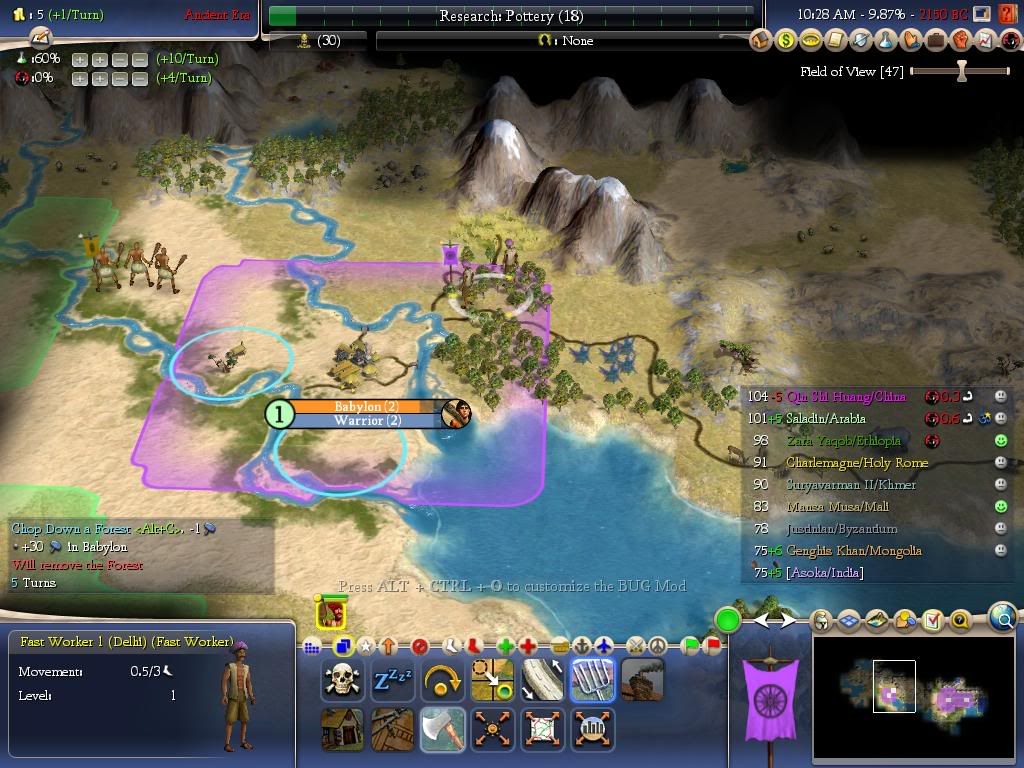
All plans to research Iron Working were put on hold. The Palace advisors, even when supplemented by the idle speculations of riverside laborers chatting after a hard day's work, were not up to the task of unlocking such secrets of metallurgy. This was especially the case when the Palace's attention was just as dedicated to maintaining ties with far-off Babylon. No, Towns were needed, especially in the western Flood Plains, to fuel commerce and science. The wise men were told to switch their focus to Pottery. Asoka only hoped that they would succeed before it was too late.
The Fast Workers wandering aimlessly about the Persian Plateau, preparing for a new city, were directed back to Babylon to provide lumber to aid Production. And, back in Delhi, the construction of a fifth Settler was cancelled in favor of another Worker. And young Gump, much to the chagrin of the more cynical councilors, was appointed Chief Advisor for life.
The Settlers' trek westward was fraught with danger. They barely dodged Lions outside of modern-day Karachi, and found their target Hill occupied by club-wielding Barbarians. A shouted challenge from the Babylon garrison, though, brought the ruffians down to be slaughtered. Relieved, the colonists finally settled down on the hill, calling it Tehran:

Tehran was a hardy little city, doomed to relative mediocrity long-term. In the short-term, though, with its Copper access and Deer, and able to borrow Flood Plains from Babylon, it would more than pay for its own maintenance.
In 1825 B.C., Chief Advisor Gump, quizzically shaping and reshaping a lump of clay in his quarters, discovered that giving a pot a bottom was instrumental in allowing it to hold water:
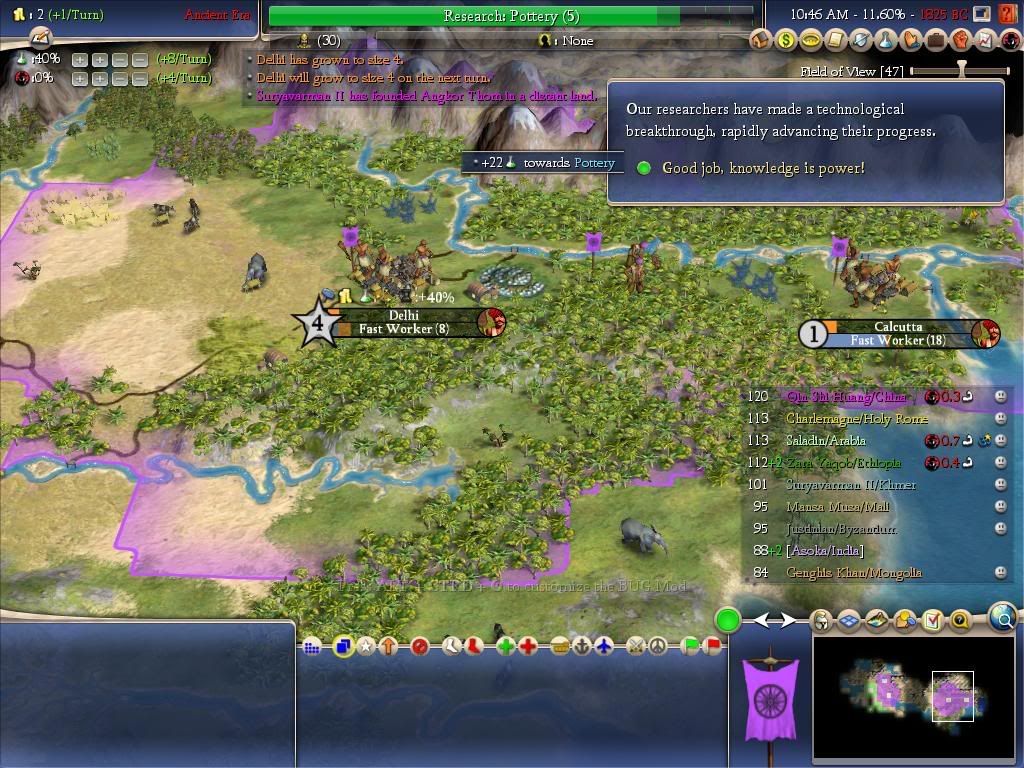
In those ancient, benighted days, this was considered a major breakthrough.
As the Indian wise men played with river-mud in the throne room, Justinian's haughty emissary stepped in to present Lord Asoka with a filigreed tablet inscribed with an intricately-scribed treaty:
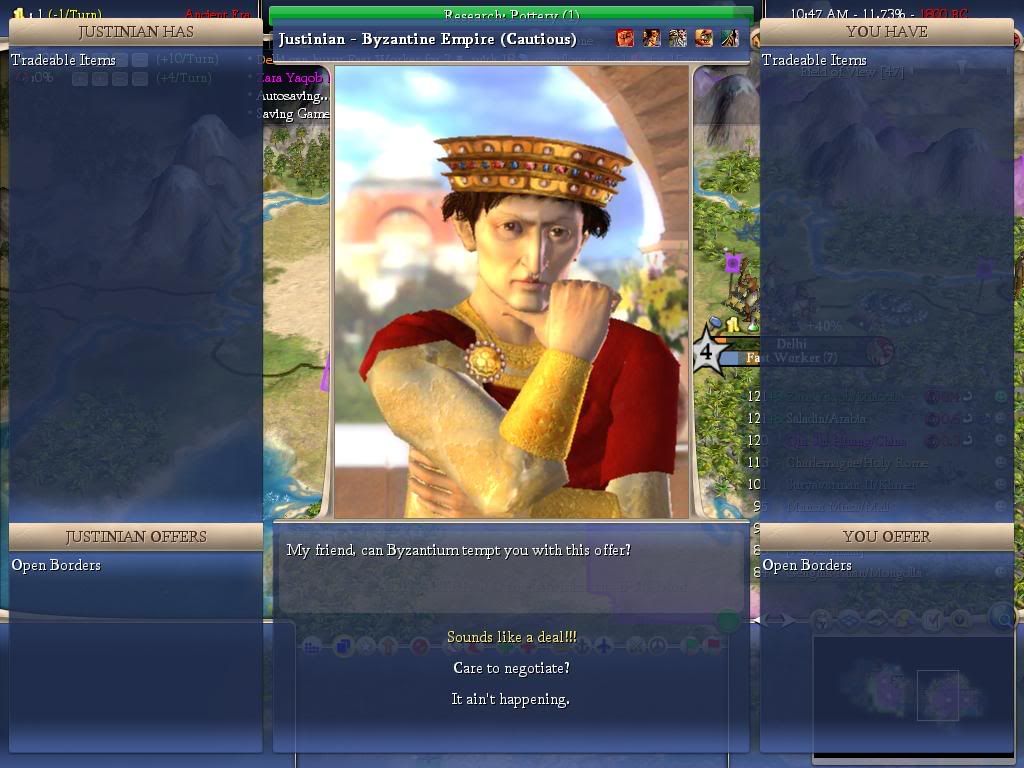
Awed by the Byzantines' ability to draw sounds, Asoka agreed to the treaty, which opened allowed trade and explorers to progress unimpeded by border guards. Of course, any attempts at Settlement would negate the treaty, but Justinian didn't need to know that just yet.
By 1250 B.C., Indian society had changed significantly:
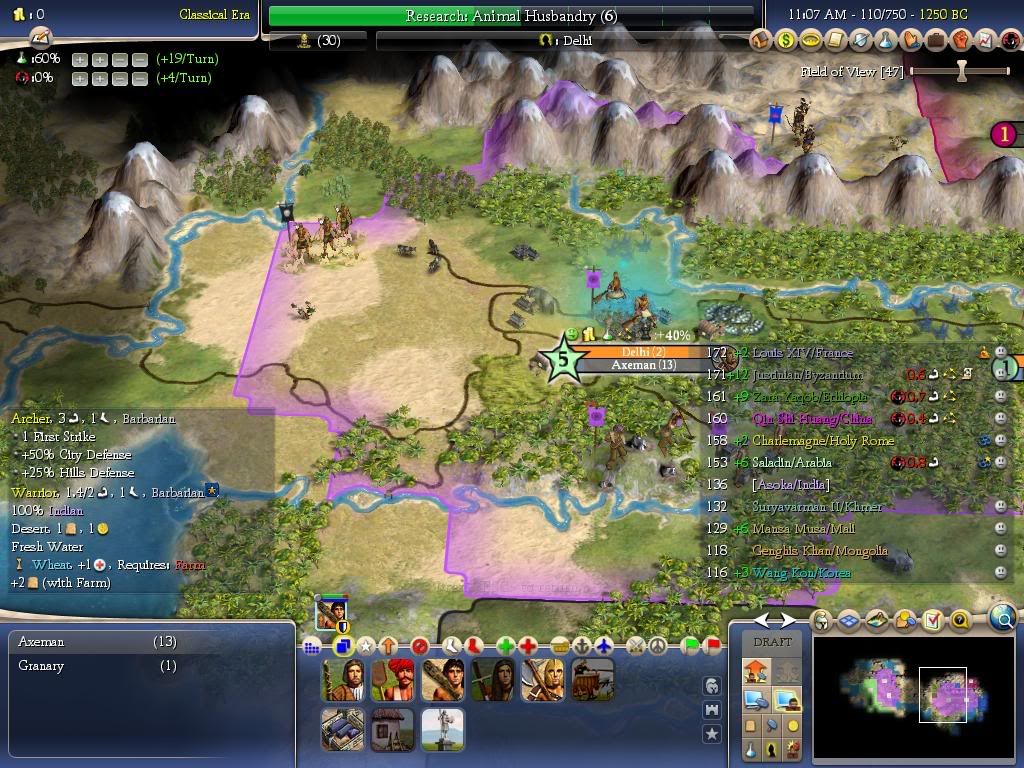
The advent of Pottery had resulted in Cottages springing up across the empire. Permanent settlements existed around Babylon and Tehran, and temporary shanty-towns sprang up around resources that would not be exploited for some time, like the infamous Elephant Village slum outside of Delhi. Iron Working had been researched, resulting in a revolution in weapons technology. The Club had been replaced with the Axe, and soon, even the Sword would come into play.
These new weapons were a boon, for the Nationless Ones had become more numerous. They sent more Warriors, along with mysterious killers able to slay from a distance. The Nationless Ones even set up a stronghold in the southern jungles.
So, here we are, at 1225 B.C. Elite Axe-Fighters defend Delhi from Barbarian hordes in the east:
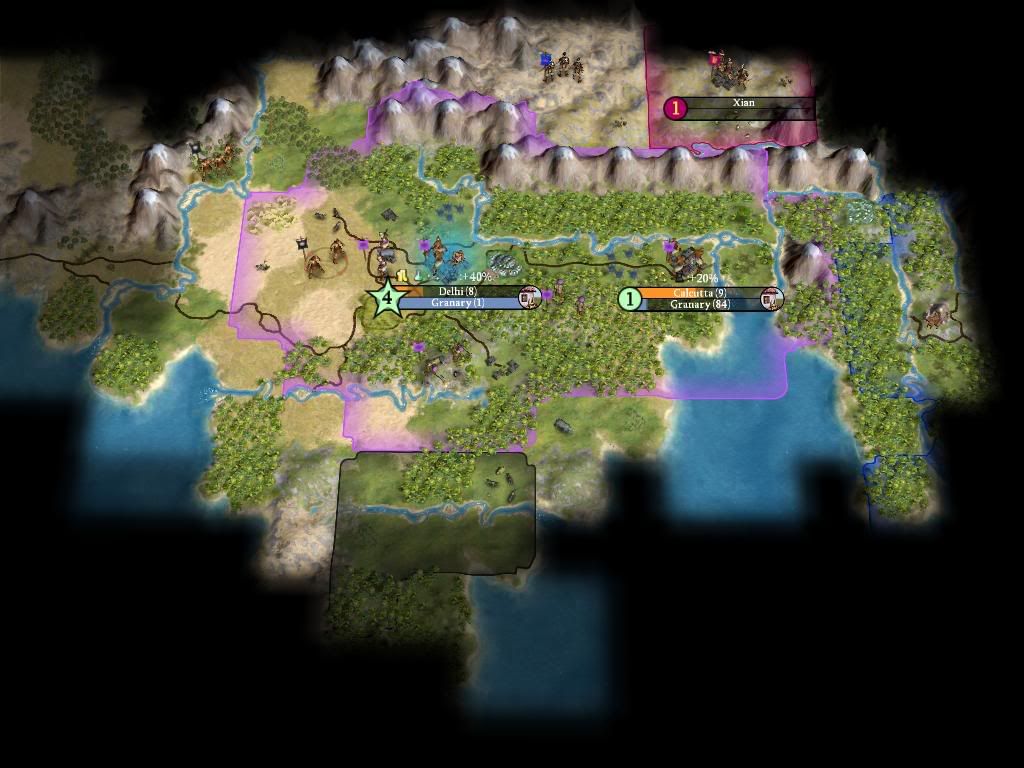
While, in the west, Babylon and Tehran contend with Arabian culture:
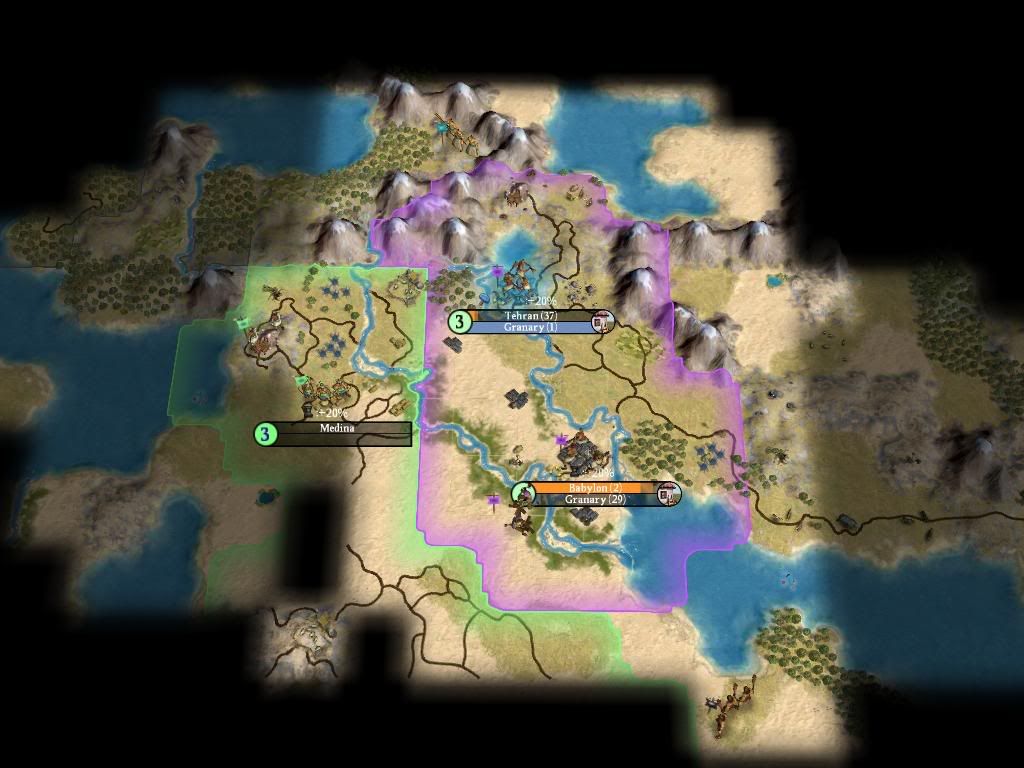
The upside to this border war is that Hinduism should spread to one city or the other fairly quickly.
Justinian, advanced as he is, is willing to make us a fine deal for Iron Working:
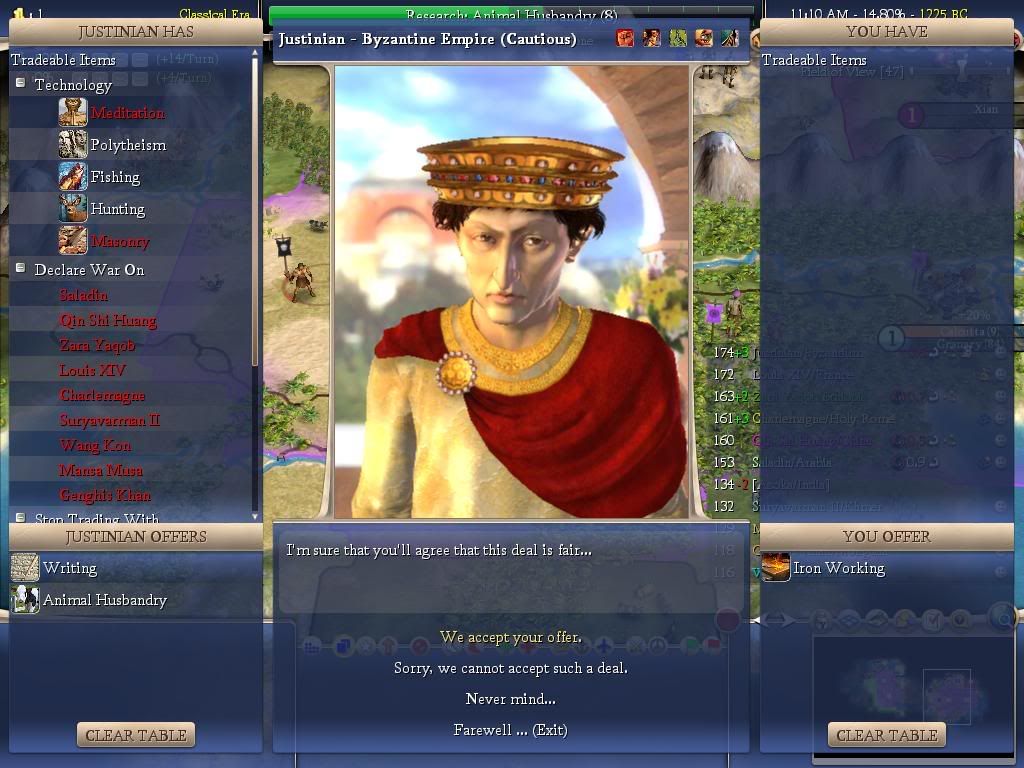
Of course, he would also be willing to trade for the usual collection of trash (Polytheism, Hunting, Fishing), but I think you all would draw and quarter me if I even considered that
So? What do you all think? Should I take the Writing/Animal Husbandry deal? Is it time to start expanding again? Should I whip up a small force of Swordsmen to take out that Barbarian city? Is it worth keeping, or should it be razed?
Here's the save:
Asoka listened intently to Advisor Gump. He was somewhat put off by the young scholar's bizarre haircut and halting speech pattern, but he was won over by his down-home charm and simple wisdom. And his suggestions were sensible. Sweeping changes were made across India:

All plans to research Iron Working were put on hold. The Palace advisors, even when supplemented by the idle speculations of riverside laborers chatting after a hard day's work, were not up to the task of unlocking such secrets of metallurgy. This was especially the case when the Palace's attention was just as dedicated to maintaining ties with far-off Babylon. No, Towns were needed, especially in the western Flood Plains, to fuel commerce and science. The wise men were told to switch their focus to Pottery. Asoka only hoped that they would succeed before it was too late.
The Fast Workers wandering aimlessly about the Persian Plateau, preparing for a new city, were directed back to Babylon to provide lumber to aid Production. And, back in Delhi, the construction of a fifth Settler was cancelled in favor of another Worker. And young Gump, much to the chagrin of the more cynical councilors, was appointed Chief Advisor for life.
The Settlers' trek westward was fraught with danger. They barely dodged Lions outside of modern-day Karachi, and found their target Hill occupied by club-wielding Barbarians. A shouted challenge from the Babylon garrison, though, brought the ruffians down to be slaughtered. Relieved, the colonists finally settled down on the hill, calling it Tehran:

Tehran was a hardy little city, doomed to relative mediocrity long-term. In the short-term, though, with its Copper access and Deer, and able to borrow Flood Plains from Babylon, it would more than pay for its own maintenance.
In 1825 B.C., Chief Advisor Gump, quizzically shaping and reshaping a lump of clay in his quarters, discovered that giving a pot a bottom was instrumental in allowing it to hold water:

In those ancient, benighted days, this was considered a major breakthrough.
As the Indian wise men played with river-mud in the throne room, Justinian's haughty emissary stepped in to present Lord Asoka with a filigreed tablet inscribed with an intricately-scribed treaty:

Awed by the Byzantines' ability to draw sounds, Asoka agreed to the treaty, which opened allowed trade and explorers to progress unimpeded by border guards. Of course, any attempts at Settlement would negate the treaty, but Justinian didn't need to know that just yet.
By 1250 B.C., Indian society had changed significantly:

The advent of Pottery had resulted in Cottages springing up across the empire. Permanent settlements existed around Babylon and Tehran, and temporary shanty-towns sprang up around resources that would not be exploited for some time, like the infamous Elephant Village slum outside of Delhi. Iron Working had been researched, resulting in a revolution in weapons technology. The Club had been replaced with the Axe, and soon, even the Sword would come into play.
These new weapons were a boon, for the Nationless Ones had become more numerous. They sent more Warriors, along with mysterious killers able to slay from a distance. The Nationless Ones even set up a stronghold in the southern jungles.
So, here we are, at 1225 B.C. Elite Axe-Fighters defend Delhi from Barbarian hordes in the east:

While, in the west, Babylon and Tehran contend with Arabian culture:

The upside to this border war is that Hinduism should spread to one city or the other fairly quickly.
Justinian, advanced as he is, is willing to make us a fine deal for Iron Working:

Of course, he would also be willing to trade for the usual collection of trash (Polytheism, Hunting, Fishing), but I think you all would draw and quarter me if I even considered that

So? What do you all think? Should I take the Writing/Animal Husbandry deal? Is it time to start expanding again? Should I whip up a small force of Swordsmen to take out that Barbarian city? Is it worth keeping, or should it be razed?
Here's the save:
madscientist
RPC Supergenius
Nicely played. I really do not know why I never picked up these game before (probably because earth maps are not my thign) but I certainly enjoy the writing style.
Nice block of the Arabs with Tehran.
So my advie:
1) Make the Justinian trade.
2) Go for another city in the Persian lands and block expnasion in that direction (from Russia and Byzantium!).
3) Right the economy as much as you can before you take the Barbarian city (yes keep it!).
Looking foreward to the next segments!
Nice block of the Arabs with Tehran.
So my advie:
1) Make the Justinian trade.
2) Go for another city in the Persian lands and block expnasion in that direction (from Russia and Byzantium!).
3) Right the economy as much as you can before you take the Barbarian city (yes keep it!).
Looking foreward to the next segments!
capnvonbaron
Democratia gladii
IMO you should burn the barb village. The location has terrible symmetry with future city sites.
IAM
Emperor
Advisor Gump! 

 love that stuff.
love that stuff.
I don't like the barb city location either and would only keep it if you waited until the population was substantial. Otherwise raze it.
Nice block in Arabia.
Make the trade. Wait... Can you pick up some other techs from other civs with iron working? Could you trade with them soon? Hate to trade a military tech to only one civ when we should be able to pick up techs from two or more civs.


 love that stuff.
love that stuff.I don't like the barb city location either and would only keep it if you waited until the population was substantial. Otherwise raze it.
Nice block in Arabia.
Make the trade. Wait... Can you pick up some other techs from other civs with iron working? Could you trade with them soon? Hate to trade a military tech to only one civ when we should be able to pick up techs from two or more civs.
huerfanista
Emperor
- Joined
- Dec 25, 2006
- Messages
- 1,276
Take the deal with Justinian. and whip libraries into Babylon and Tehran - they'll help immensely with the culture war. Running some scientists will also help get you to alpha/curr/CoL to straighten out the imperial finances.
The barb city isn't horribly placed, but you might want to reveal the fog on the coast to see if there are any resources there (hint, hint ). In any case, you'll get some
). In any case, you'll get some  from capturing it, which will help.
from capturing it, which will help.
The barb city isn't horribly placed, but you might want to reveal the fog on the coast to see if there are any resources there (hint, hint
 ). In any case, you'll get some
). In any case, you'll get some  from capturing it, which will help.
from capturing it, which will help."Barbarian cities is like a box of chocolates, y'all never know whatca find inside."
That barb city is right in line with huertanista's earlier, excellent dotmap. It's a keeper. Take your time though, give barbie a chance to build you another city at the southern tip before you bust the fog. Just watch out for raiding parties from Justy.
That barb city is right in line with huertanista's earlier, excellent dotmap. It's a keeper. Take your time though, give barbie a chance to build you another city at the southern tip before you bust the fog. Just watch out for raiding parties from Justy.
Pohjalainen
Chieftain
Good round and excellent writing! 
I think the trade with Justian is a good one and the barb city is a keeper but it won't be going anywhere so no rush to take it. You can expand and let the barbs built you a nice city and collect it when the time is ripe.

I think the trade with Justian is a good one and the barb city is a keeper but it won't be going anywhere so no rush to take it. You can expand and let the barbs built you a nice city and collect it when the time is ripe.
re: madscientist- Welcome, welcome! I, of course, appreciate each and every set of eyeballs that bothers to come check out my humble series, but having an illustrious name such as yourself check in is a special treat. I'm afraid that, compared to some of your impressive beatsticks, I tend to field Stacks of Minor Inconvenience, so you'll just have to join the chorus regarding my paltry armies. Regarding your suggestions, Russia didn't make it to the party, but, yeah. Anything we can do to curb Byzantium's ability to become a monster is a good thing. Persepolis will be founded real soon now.
re: Barb City- Unfortunately, I think my placement of Calcutta sends huerfanista's Indian dotmap to hell, and I know that his Persian dotmap is long since invalidated, so I think we need to rethink city placement. This is my new dotmap:
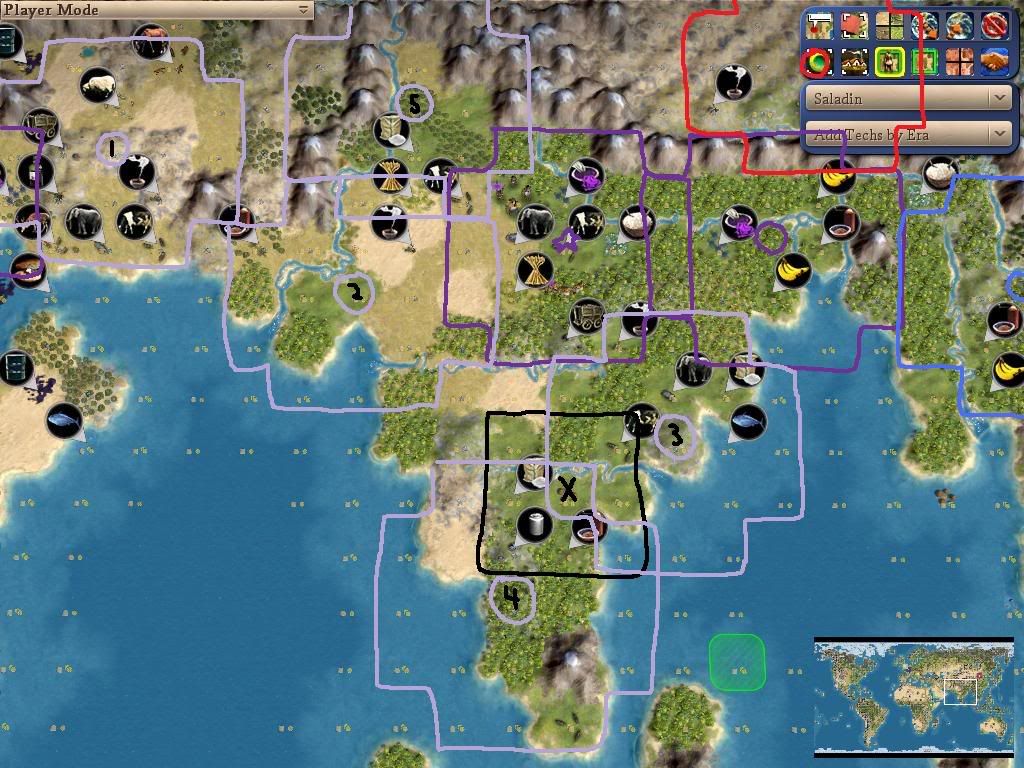 As you can see, with our cities as presently constituted, that Barbarian city is in the way. Unfortunately, at this point, it's probably staffed with Archers, so we'll need real forces to knock it out.
As you can see, with our cities as presently constituted, that Barbarian city is in the way. Unfortunately, at this point, it's probably staffed with Archers, so we'll need real forces to knock it out.
re: Tech Trades- Sadly, Justinian was first to Alphabet, so no, we can't trade Iron Working around just yet, but I think he's got us over a barrel on this one. Our research rate is still way too slow and we have way too many animal resources crawling around not to take that trade now, even if it does make a monster even scarier.
re: Barb City- Unfortunately, I think my placement of Calcutta sends huerfanista's Indian dotmap to hell, and I know that his Persian dotmap is long since invalidated, so I think we need to rethink city placement. This is my new dotmap:
Spoiler :

re: Tech Trades- Sadly, Justinian was first to Alphabet, so no, we can't trade Iron Working around just yet, but I think he's got us over a barrel on this one. Our research rate is still way too slow and we have way too many animal resources crawling around not to take that trade now, even if it does make a monster even scarier.
huerfanista
Emperor
- Joined
- Dec 25, 2006
- Messages
- 1,276
@Neal
Yeah, your site for #3 was kinda what I was suggesting. You definitely don't want to miss out on that fish that was in the fog. Re: Persepolis, I've never been a fan of that spot. Persepolis has lots of potential production, but without the clams it never has enough food to realize it. I still think settling on the wine is the best long-term location for that city. There's no pressure to settle the horses since Russia is empty, and will be for a long time. You can easily put another city up there to grab the horses/oasis later. I'd also move #2 1NW for more
You definitely don't want to miss out on that fish that was in the fog. Re: Persepolis, I've never been a fan of that spot. Persepolis has lots of potential production, but without the clams it never has enough food to realize it. I still think settling on the wine is the best long-term location for that city. There's no pressure to settle the horses since Russia is empty, and will be for a long time. You can easily put another city up there to grab the horses/oasis later. I'd also move #2 1NW for more  and good
and good  to work them. I'd station a couple of axes in the valley N of Persepolis - it's a major barb corridor with all of that unsettled land in eastern Russia.
to work them. I'd station a couple of axes in the valley N of Persepolis - it's a major barb corridor with all of that unsettled land in eastern Russia.
Yeah, your site for #3 was kinda what I was suggesting.
 You definitely don't want to miss out on that fish that was in the fog. Re: Persepolis, I've never been a fan of that spot. Persepolis has lots of potential production, but without the clams it never has enough food to realize it. I still think settling on the wine is the best long-term location for that city. There's no pressure to settle the horses since Russia is empty, and will be for a long time. You can easily put another city up there to grab the horses/oasis later. I'd also move #2 1NW for more
You definitely don't want to miss out on that fish that was in the fog. Re: Persepolis, I've never been a fan of that spot. Persepolis has lots of potential production, but without the clams it never has enough food to realize it. I still think settling on the wine is the best long-term location for that city. There's no pressure to settle the horses since Russia is empty, and will be for a long time. You can easily put another city up there to grab the horses/oasis later. I'd also move #2 1NW for more  and good
and good  to work them. I'd station a couple of axes in the valley N of Persepolis - it's a major barb corridor with all of that unsettled land in eastern Russia.
to work them. I'd station a couple of axes in the valley N of Persepolis - it's a major barb corridor with all of that unsettled land in eastern Russia.madscientist
RPC Supergenius
re: madscientist- Welcome, welcome! I, of course, appreciate each and every set of eyeballs that bothers to come check out my humble series, but having an illustrious name such as yourself check in is a special treat. I'm afraid that, compared to some of your impressive beatsticks, I tend to field Stacks of Minor Inconvenience, so you'll just have to join the chorus regarding my paltry armies. Regarding your suggestions, Russia didn't make it to the party, but, yeah. Anything we can do to curb Byzantium's ability to become a monster is a good thing. Persepolis will be founded real soon now.
.
Just remember my stacks of hell came at marathon and at Monarch (you are at epic/Immortal!). they are a great in comparison the the RPCs. You try to hold true to history, and I do my best to mock it!!!!

I am also trying off-line Earth maps but find them quite a different game. Hatty of Egypt is rather intersting with either massive flooplains and incredible jungle.
I will enjoy lurking!
vanatteveldt
Emperor
I think placing your 5 1SW gives a very nice production city, four (handicapped) food sources (plains cow, desert wheat, floodplain, sugar) and enough hills. That comes at the expense of your (2), which you can also shift 1SW for more coast and make it into a fishing village, so it is a matter of choosing production over commerce, I think... I agree with persepolis on the wine.
I think that if the gal is to go cultural, you need to re-think the dot-mapping to perfect that goal: Map out three fat cities with great food to run artists and good production to build infrastructure (cathedrals are pricy). Then see what kind of second-tier cities you can squeeze in around them. That barb city looks nice for a Legendary city, while your dotmap slices the subcontinent up equally but ends up with a ton of water tiles in every city.
IAM
Emperor
@ Neal if you're gonna make the trade (with Justin) then can we at least go for alphabet (after) to pick up back techs and then get our goody techs to build and trade?
I like your dot map.
Please. Oh Please. Mr. Neal can we have at least a small border war?
I like your dot map.
Please. Oh Please. Mr. Neal can we have at least a small border war?

capnvonbaron
Democratia gladii
How about moving city 4 1NW onto the desert tile and putting a settlement on Sri Lanka?
Similar threads
- Replies
- 33
- Views
- 1K
- Replies
- 24
- Views
- 1K
- Replies
- 9
- Views
- 2K
- Replies
- 27
- Views
- 3K
